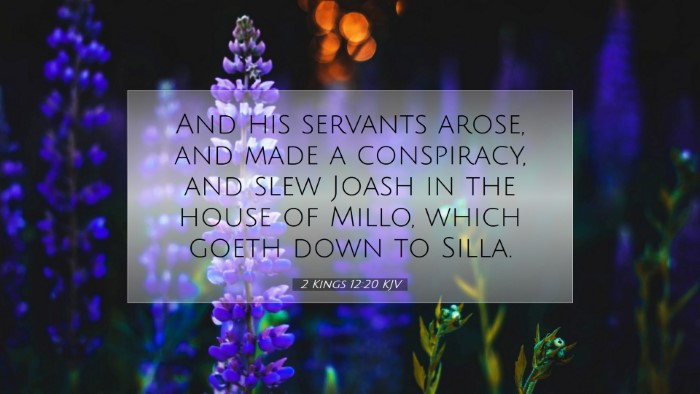Old Testament
Genesis Exodus Leviticus Numbers Deuteronomy Joshua Judges Ruth 1 Samuel 2 Samuel 1 Kings 2 Kings 1 Chronicles 2 Chronicles Ezra Nehemiah Esther Job Psalms Proverbs Ecclesiastes Song of Solomon Isaiah Jeremiah Lamentations Ezekiel Daniel Hosea Joel Amos Obadiah Jonah Micah Nahum Habakkuk Zephaniah Haggai Zechariah Malachi2 Kings 12:20
2 Kings 12:20 KJV
And his servants arose, and made a conspiracy, and slew Joash in the house of Millo, which goeth down to Silla.
2 Kings 12:20 Bible Commentary
Commentary on 2 Kings 12:20
2 Kings 12:20 states:
“And his servants arose, and made a conspiracy, and slew Joash in the house of Millo, which goeth down to Silla.”
Context and Overview
The narrative of Joash's reign is crucial in understanding the historical context of Israel's monarchy. Joash, also known as Jehoash, was a king of Judah whose life and reign were characterized by significant religious reforms as well as political intrigue.
Historical Background
Joash was crowned king at a very young age after the overthrow of Athaliah. He became a king who, under the mentorship of the High Priest Jehoiada, undertook considerable reforms, especially in restoring the temple of the Lord (2 Kings 12:1-16). However, after the death of Jehoiada, Joash's fidelity to Yahweh began to unravel, leading to his downfall.
Insights from Public Domain Commentaries
Matthew Henry's Commentary
Matthew Henry observes the tragic end of Joash as a result of his decline into idolatry and the neglect of the temple after Jehoiada’s death. Henry points out that:
- Conspiracy: The 'conspiracy' signifies a betrayal not just of a ruler but of the covenant community that had seen God’s deliverance through Joash.
- Location: The choice of 'the house of Millo' for the murder indicates a place of significant political importance, symbolizing the crumbling of Joash’s reign.
- Consequences of Apostasy: Henry highlights that the severing of Joash from God’s ways led to his undoing, reflecting the Biblical principle that apostasy leads to judgment.
Albert Barnes' Commentary
Albert Barnes elaborates on the events leading to Joash's assassination, pointing out how his reliance on human alliances ultimately let him down. Some insights from Barnes include:
- Influence of Leaders: Barnes asserts that Joash's spiritual decline can be traced back to his lack of leadership after Jehoiada's death. This illustrates the need for godly influence among rulers.
- Servants' Role: The servants who conspired against Joash reveal the risks associated with neglecting governance and morale in his court.
- God's Judgment: The murder signifies God’s judgment on Joash for forsaking the ways of righteousness.
Adam Clarke's Commentary
Adam Clarke emphasizes the moral and theological implications surrounding Joash's demise. Key points from Clarke include:
- Retribution: Clarke views Joash's death as a direct consequence of his actions against the covenant, showcasing the Biblical principle of retributive justice.
- Character Influence: He highlights the character of Joash, who, though initially righteous, succumbed to pressures from idolatrous influences, illustrating the vulnerability of leaders to corruption.
- Temple Neglect: Clarke stresses the importance of the temple as a symbol of God’s presence and the devastating result when a leader neglects this sacred space.
Theological Implications
The events of 2 Kings 12:20 serve as a poignant reminder of the dangers that come with turning away from God. Pastors and scholars can reflect on the following theological implications:
- Apostasy and Its Consequences: Joash's life serves as a warning about the repercussions of turning away from God’s statutes. The apostasy of a leader can lead a nation away from its covenant with God.
- God's Sovereignty: The timing of Joash's death indicates God’s control over historical events, emphasizing that God can use even human conspiracies to fulfill His purposes.
- The Importance of Righteous Leadership: The church today must reflect on how leadership influences the spiritual state of congregations. Like Joash, leaders risk losing their way without accountability and guidance.
Conclusion
In contemplating 2 Kings 12:20, we see the tragic unraveling of a once-promising king. This narrative, layered with political intrigue and spiritual decline, offers profound lessons for current generations. It calls for vigilance in leadership, the importance of spiritual mentorship, and the necessity of upholding the covenant relationship with God. In light of these commentaries, both historical and theological insights provide a solid foundation for teaching and applying the scriptures to contemporary faith contexts.


